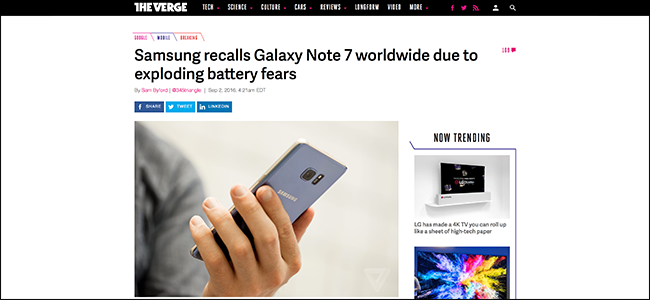
While lithium-ion batteries are, on the whole, incredibly safe they do very very occasionally catch fire or explode. When it happens, like with Samsung’s Galaxy Note 7 fiasco or HP’s more recent laptop recall, it’s always big news. So what’s going on and why do batteries sometimes go out with a bang?
Let’s find out.Rechargeable lithium-ion batteries—the kind of battery that’s inside your laptop, phone, tablet, and pretty much every other modern gadget you own, as well as electric cars and airplanes—are responsible for the portable device revolution. Without lithium-ion batteries, I wouldn’t be able to write this article sitting in a coffee shop; instead, I’d need to be plugged into a power source the whole time.
What’s Inside a Lithium-Ion Battery?
To understand why lithium-ion batteries sometimes fail, you need to know what’s going on under the hood. Inside every lithium-ion battery, there are two electrodes—the positively charged cathode and the negatively charged anode—separated by a thin sheet of “microperferated” plastic that keeps the two electrodes from touching. When you charge a lithium-ion battery, lithium ions are pushed by electricity from the cathode, through the microperferations in the separator and an electrically conductive fluid, and to the anode. When the battery discharges, the reverse happens with the lithium ions flowing from the anode toward the cathode. This is the reaction that powers your laptop.
Small batteries, like those found in smartphones, usually have only a single lithium-ion cell.
Larger batteries, like those in laptops, normally have between 6 and 12 lithium-ion cells. The batteries in electric cars and airplanes can have hundreds of cells.What Makes a Lithium-Ion Battery Explode?
The very thing that makes lithium-ion batteries so useful is what also gives them the capacity to catch fire or explode. Lithium is really great at storing energy. When it’s released…
The post Why Do Lithium-Ion Batteries Explode? appeared first on FeedBox.